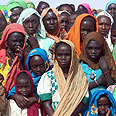This anecdote has two points – the first one is encouraging, while the second one is a little less so. We'll start with the encouraging one: If a representative of the Holocaust commemoration establishment (and a Holocaust survivor himself) sees fit to tie the Holocaust of the Jews to what is going on in Sudan today, it means that at least in terms of awareness we are starting to fall into line with the Western world.
In Europe and the United States, the Darfur region horrors have been making headlines for years now; ever since Arab militias began massacring the region's black residents, the international community has been trying (without much success) to stop the massacre and assist the survivors.
Yet here, as always, we're not really interested in anything that is a little beyond our borders. Yet recently we have seen a positive perceptual development: More and more Israelis hear about what's going on in Sudan and realize this is not just another story about two tribes killing each other, but rather, true genocide.
Now, to the less pleasant point: As opposed to other horrors in the world, where all we can do is express sympathy and shake our head with sadness, in the case of the Darfur genocide Israel can actually offer assistance, but it chooses to stick its head in the sand.
The fact that we have refugees from that genocide that have been imprisoned in Israel long enough to understand the high-level Hebrew spoken at Yad Vashem ceremonies says something very depressing about our attitude to them. Not to all of them, though – Israel actually transferred impressive economic aid to the two million Sudanese refugees left in Africa. However, somehow it doesn't quite know how to handle the refugees that arrived here.
About 350 refugees who somehow found the difficult route of escape entered Israel in recent years in the hopes of being granted political asylum – instead, most of them have been rotting in prison for long months without a trial and for no purpose.
Significant diplomatic implications
The official reason for the harsh treatment of the Sudanese is the fact they are the nationals of an enemy country and as such, they have no possibility of submitting an official request for refugee status. As opposed to any other person who enters Israel illegally and is subjected to a genuine legal procedure, the Sudanese are detained based on a draconian law that enables the State to imprison them forever, theoretically.
Human right groups were able to convince the courts to temporarily transfer the refugees to kibbutzim and moshavim, until a true solution is found for them. However, this is a temporary solution and it takes forever. Garang, for example, has spent nearly a year in prison. There are some who have been jailed for longer even, and have nothing to do in order to pass the time.
We can view the story of the Sudanese refugees as yet another example of typical Israeli indifference, and we can also make do by saying that our own poor should take precedence. However, this story not only has humanitarian meaning, but also significant diplomatic and PR implications.
The story of Darfur refugees in Israel has been prominently featured in the most important newspapers in the world over the past year, and it presents us in a rather dubious light. Ranging from the New York Times to BBC and Newsweek, everyone writes about the harsh attitude displayed by the Jewish State to people who escaped genocide in Africa. And this is happening at the time when Israel seeks the world's help in the battle against Iran in the name of universal morals and justice. Hence, Israel is losing some points just when it needs them most.
The international day of solidarity with the victims of the Darfur genocide is marked around the globe through mass rallies and protests. In Israel too, a demonstration took place across from the government building on Tel Aviv's Begin Street. People who care lit candles on behalf of the Sudanese refugees who are in Israel, in the hope that by next year the State will decide what to do with them. If we don't do it for them, at least let's do it for ourselves.
Should the State fail to decide what to do with Garang and his friends, they may find themselves in prison during next Holocaust Memorial Day as well. Then, expressions such as "the world was silent" and "never again" will be even more embarrassing.
The writer serves as the spokesman of the committee for Darfur refugees
















